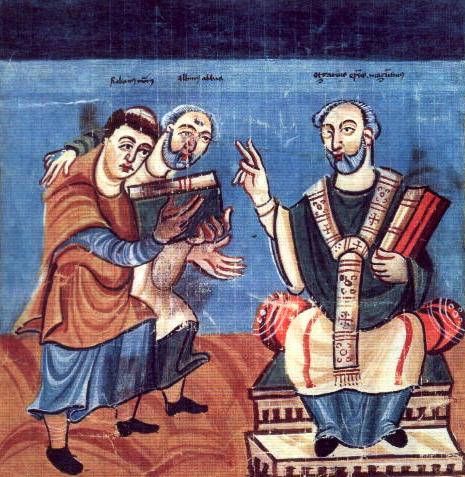Fw: Six Rabannus Maurus entries
----- Forwarded Message -----
From: Donald ...
To: "William ....
Sent: Wednesday, 28 October 2015, 6:03
Subject: Six Rabannus Maurus entries
From: Donald ...
To: "William ....
Sent: Wednesday, 28 October 2015, 6:03
Subject: Six Rabannus Maurus entries
Dear William,
Our continuing of "My forehead. Enter into my thoughts."
Thank you comment and below to follow the furrows in Rabanus Maurus at 'enlargingtheheart.wordpress.com', six Entries included. May not be in our library.
Angels.
Yesterday at Western General Hospital, Raymond and I went to visit 93yr Mary in the maze to search. At the Reception an elderly WWW voluntary aid kept us all the way of paths by buildings, lifts and wards! 'Angel' I called her as she realized. And Mary suffering shingles, herself an Angel too. Hospital staff all so kind.
...yours,
Donald
Sent from my iPad.
Sent from my iPad.
__________________________________________
Fw: this interior listening
----- Forwarded Message -----
From: William ...
To: nunrawdonald ...
Sent: Tuesday, 27 October 2015, 19:30
Subject: Re: this interior listening
From: William ...
To: nunrawdonald ...
Sent: Tuesday, 27 October 2015, 19:30
Subject: Re: this interior listening
Dear Father Donald,
There is a practical snag here for me... "No one learns anything through speech... unless the mind is anointed with the Spirit" And yet, the spoken word does not always 'register' for me its full meaning, (first thoughts distracting me), and when I do realize the meaning of all that I have just heard, the echo is gone! Whereas the written word places its meaning before me to consider and reflect upon, and review the meaning of one phrase caught up into the next: Lectio is for me this "interior listening".
I need the text for the full value of the spoken word to register. I wonder if that was in the mind of the writers of the Gospels as they sought to capture the depth of the meaning relayed in the oral traditions?
Just William
----Original message----
Date : 27/10/2015 - 07:34 (GMTST)
...
Cc ...
Subject : Night Office
The mind has the wealth of thoughts.
Date : 27/10/2015 - 07:34 (GMTST)
...
Cc ...
Subject : Night Office
The mind has the wealth of thoughts.
Sent from my iPad.Monday, Nov 7 2011
Early Latin Monks and MONASTIC and PATRISTIC and Rabanus Maurus grace, heart, Holy Spirit, interior life, mind, scripture 8:55 amIn the Gospel he who is Truth himself says to his disciples:When you stand before kings and princes, do not think how you are to speak, or what you are to say; what you are to say will be given you at the time, for it is not you who will be speaking but the Spirit of your Father speaking through you.We must realise that the grace of the Holy Spirit is necessary not only for those who teach but also for those who are taught.Unless the Spirit is present in the heart of the listener, the teacher is wasting his breath.Unless there is a teacher within us, the teacher without works in a vacuum.In Church we all hear the same voice speaking, but all do not understand it in the same way.Since there is no difference in what is said, why is there a difference in our understanding of it, unless there is an interior teacher giving certain people special instruction through their understanding of words of admonition addressed to all?Concerning this grace of the Holy Spirit, John says: His anointing will teach you everything.No one learns anything through speech, therefore, unless the mind is anointed with the Spirit.Because King Jehoiachim and his servants were not inwardly illumined by the grace of the Holy Spirit who inspired the Prophet, their bodily ears could hear the words of God, but the ears of the heart were deaf to them.It is this interior listening which our Lord demands in the Gospel when he says: Those who have ears to hear, let them hear.One has to marvel at the blindness of the human mind and the wickedness of the hardened heart.Those whom salutary admonitions should have filled with compunction and sorrow for their sins were at pains to burn the scroll containing the words of the Lord.They also took every opportunity to insult the Prophet whom they ought to have honoured for his inspired teaching and admonitions.And why did they do this? Was it not because there was in them the sort of wicked spirit that always resists grace?Yet human pride is impotent when it sets itself to resist divine sovereignty.An earthly King gave orders for the Prophet and his scribe to be arrested and sent to prison;the King of heaven shielded his blameless saints from human malice so that they came to no harm.Rabanus Maurus (c.780-856): Commentary on Jeremiah, 13 (PL 111:1073-75); from the Monastic Office of Vigils, Tuesday of Week 30 in Ordinary Time, Year 1
Sent from my iPad.
Sancta Maria Abbey: http://www.nunraw.com.uk (Website) Blogspot :http://www.nunraw.blogspot.co.uk, Doneword :http://www.donewill.blogspot.co.uk |domdonald.org.uk, Emails: nunrawdonald@yahoo.com, nunrawdonald@gmail.com





